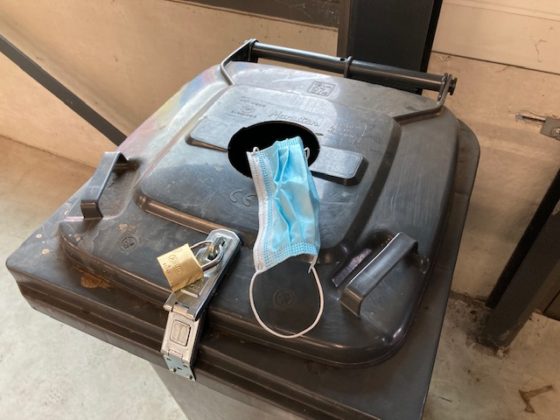Face masks become compulsory and testing open to those without symptoms


Face masks become compulsory in all indoor public places in the Netherlands from Tuesday, and the measures will be valid for three months at least.
The rules apply to everyone over the age of 13 and those caught without a face mask face a fine of €95.
Medical masks remain reserved for healthcare workers but people should ensure the masks they wear cover both nose and mouth. ‘By choice, use a mask bought a pharmacy or supermarket,’ the justice ministry instructions state. Scarfs and plastic shields are not considered to be acceptable.
In addition, from Tuesday, people who are alerted via the CoronaMelder app or a health official that they have been in close contact with someone who has tested positive for coronavirus will be able to get a test without having symptoms.
Public spaces
Face masks have to be worn in all public indoor spaces, such as shops, museums, petrol stations, restaurants and bars (if open), theatres, cinemas and concert halls. Once people are seated at their table in the restaurant or in the theatre auditorium they can take the mask off but if they go to the toilet or leave it has to go back on.
Places of worship, such as churches, temples, synagogues and mosques, are exempt from the rule.
Face masks were already compulsory on public transport but will now have to be worn inside railway station buildings and at airports as well.
Schools and universities
Students, teachers and support staff will all have to wear a face mask when moving around the school building. The mask can come off during classes when everyone is seated but teachers who talk while walking around the classroom will have to wear one.
Face masks won’t have to be worn during PE classes, theatre or singing classes and in some forms of vocational education.
Contact professions and healthcare
Hairdressers, driving instructors and nail stylists and others in the so-called contact professions will have to wear a face mask, as will their clients.
Healthcare professionals such as family doctors and physiotherapists are exempt from the rule but healthcare institutions have their own rules and both professionals and patients will have to follow those.
Exceptions
People who have health problems which would make wearing a face mask difficult are exempt but will have to make this clear to police or street wardens who may confront them. The the rules do not specify how they should do this.
Face masks need not be worn during sport activities, acting, rehearsals or shows and during television or radio interviews.
Europe
The Netherlands is one of the last countries in Europe to impose the wearing of masks following pressure from the public and MPs. The Dutch health institute RIVM which advises the government still maintains that face masks do not significantly lower the risk of infection.
Retail chains, such as Ahold, which comprises Albert Heijn, Etos and Gall & Gall, have already said they will ‘inform customers about the obligation but not refuse non-wearers’.
Thank you for donating to DutchNews.nl.
We could not provide the Dutch News service, and keep it free of charge, without the generous support of our readers. Your donations allow us to report on issues you tell us matter, and provide you with a summary of the most important Dutch news each day.
Make a donation